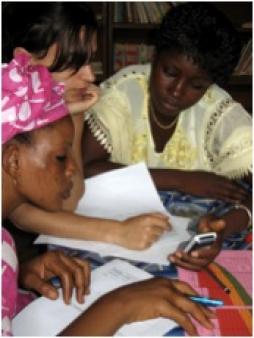mobile monitoring
Posted by AnneryanHeatwole on Dec 19, 2011
Mali has one of the highest infant mortality rates in the world. There are roughly 111 deaths for every 1000 live births in the country and the under-5 mortality rate is 191 out of every 1000 children. The need for early detection of diseases and stronger local health structures led to the creation of Pesinet, a non-profit that uses mobile technology to provide regular health checkups and affordable health insurance for young children in Mali's capital, Bamako.
Roughly 600 children are currently enrolled in the program in the neighborhood of Bamako Coura, under the care of four Pesinet agents (each covering around 150 children). Pesinet combines both early warning systems and insurance. Families pay 500 CF a month for each enrolled child; the payments cover doctor examinations and half the cost of any medications the child needs if he or she gets sick.
Enrolled children are tested weekly for symptoms of illness such as fever, cough, diarrhea, low weight, or vomiting by community health workers who enter data from each visit into a custom-designed Java application on their phone. The data is sent via GPRS to an online database. Doctors at local community health centers monitor the patient data for sudden changes in health. If changes occur, the community health workers receive an alert on their phones and then go back, in turn, to alert the family that the doctor needs to give the child a checkup.
| Pesinet: Mobile Monitoring and Micro-Insurance for Children in Mali data sheet 1301 Views |
| Countries: |
Mali
|
Posted by VivianOnano on Jun 09, 2011
Study on Potentials of Mobile Phones in Investment and Development Projects data sheet 1420 Views
Abstract:
This report draws on the experiences of projects using mobile phone-based information and communication technologies (ICT) applications in a number of situations, including mobile monitoring and evaluation, m-banking, community development, literacy, anti-corruption, agricultural extension and agricultural value chain information and access.
The report begins with a general overview of the role that mobile phone-based ICT can play in development and commercial projects, focusing on the situations in which mobile phonebased applications are particularly appropriate, on the potential impacts that they can achieve and on their comparative advantages vis-a-vis other forms of mobile ICT.
The report then considers in more detail the experience of the projects in using mobile phone-based ICT, shedding light on such issues as the appropriateness and relevance of the systems used, their replicability and scalability and their sustainability.
Posted by PrabhasPokharel on Aug 17, 2009
As Afghanistan's second democratic elections nears on August 20th, journalists are gearing up for fair and accurate reporting. The NGO Nai and the media development organization Internews have trained journalists and civil society workers over the past few months in fair and accurate reporting. Training includes, according to Internews, "active learning practices, the understanding of regulatory information on all aspects of the elections, and the importance of fair reportage."
Posted by LeighJaschke on Jul 14, 2009
Automating Internal Control at a Rural Coffee Cooperative data sheet 2852 Views
Author:
Vila; Mario, Scwartzman, Yael; Parikh, Tapan S.
Abstract:
Internal control systems allow agricultural cooperatives
to monitor the growing practices of their members, ensuring
adherence to various standards for quality, and for meeting
external certification requirements. In this paper, we present
the motivation, design and evaluation of an automated mobile
data collection, evaluation and reporting tool for internal control
at a coffee cooperative. Our design goals were to improve the
efficiency of this process, and to increase the accountability of
various stakeholders. Based on a three-month pilot deployment,
we have demonstrated a 30% reduction in inspection time and
71% reduction in evaluation time, compared to the earlier paperbased
approach, which relied on several manual data collection
and information processing steps. We also present the results
of a qualitative evaluation of the system, including real field
experiences and the perceived benefits and drawbacks of the
automated system from the perspective of inspectors, farmers
and other stakeholders.
Posted by CorinneRamey on Dec 10, 2007
A new website called the Hub, calling itself "the global platform for human rights media and action," has its official beta launch today in honor of International Human Rights Day. The Hub, a project of human rights advocacy group WITNESS, hopes to create a new space for human rights related video content, including footage shot on mobile phones.
Tamaryn Nelson, program coordinator for Latin American and the Caribbean at WITNESS, told MobileActive that the Hub goes beyond the capabilities of YouTube. "There's no real place for human rights related material [on YouTube]," she said. "YouTube has tons of videos, but if you go onto YouTube and try to find a video related to human rights it's like finding a needle in a haystack. With the Hub, Tamaryn said, human rights advocates will be able to create a campaign around their videos, join online chats, provide context, and frame videos from a human rights perspective.

